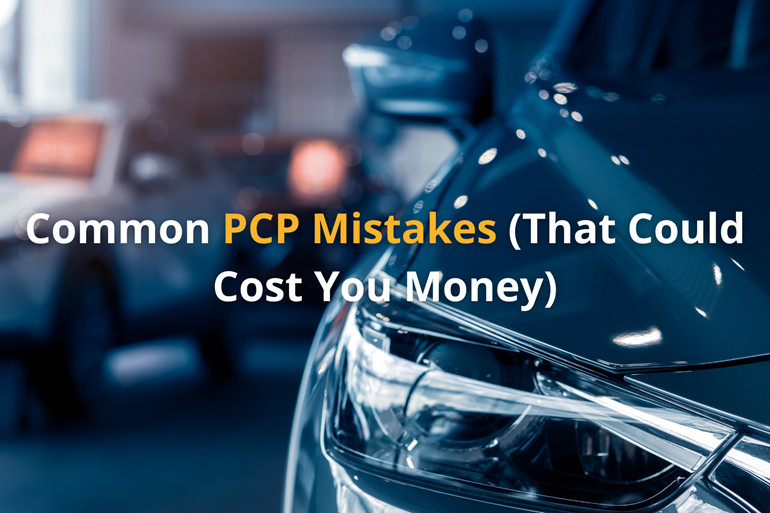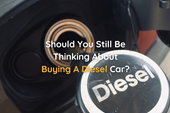
Common PCP Mistakes (That Could Cost You Money)
Stay In Control Of Your PCP & Avoid These Costly Mistakes With Our Latest Guide…
If you’re considering a new car but want to keep monthly payments under control a PCP (or ‘Personal Contract Purchase’, to give it its full name) could be the perfect option for you.
If you’ve already started your new car research or even visited a dealership, the chances are you will have heard of them. That’s no surprise, as 80-90% of new cars are financed through PCPs in the UK, but are they too good to be true?
If suitably sold, PCP can be a great way to buy your new car, but there can be some hidden charges, in this article we’re looking at the most common PCP mistakes drivers make, that ultimately, lead to extra costs.
First though, let’s take a look at PCP in more detail.

What Is a PCP
Before PCPs the standard way to finance a car was using Hire Purchase (HP), akin to a traditional car loan. Essentially, buyers pay an optional deposit followed by a fixed number of monthly payments, after which, you own the car outright.
PCP differs slightly as you don't finance the whole value of the car, just a portion of it; which is the part your monthly payment covers. At the end of those monthly payments you have a few options, one of which is to pay the outstanding balance, often known as the ‘balloon payment’.
How Does PCP Work?
Pay An Optional Deposit
As with most car purchases, dealerships ask for an optional deposit, which is usually 10% of the car's value.
Whilst it’s not always obligatory to pay a deposit it can help reduce your monthly payments, with a general rule of thumb being; the more deposit you pay upfront, the lower your monthly payments will be.
As well as this, some dealerships, manufacturers or finance providers may offer an incentive or ‘deal’ based on specific PCP deposit amounts, such as ‘0% finance when you deposit £10k’.
Agree Your Terms
When putting your PCP together, there are two key questions; 1. How Many Miles Do You Expect To Do Yearly? And 2. How Many Months Do You Want Your PCP Over?
Typically, a PCP will run from 2-4 years, with some running up to 5 years.
Remember, these elements will affect the monthly payment and/or optional final payment (balloon payment), with a higher mileage affecting your balloon payment (which is calculated by estimating the vehicle cost at the end of your contract) and a shorter contract term increasing your monthly payments (but often resulting in less interest paid).
Pay Your Monthly Repayments (Bulk Of the PCP Agreement)
After you’ve signed your contract and picked up your new car, you’ll drive it and ‘own’ it as normal on a daily basis, making your fixed monthly repayments.
The End Of Your Agreement
Towards the end of your agreement, usually about 6 months before it’s due to fully expire, your car dealership or finance company will contact you and let you know about your options. Here’s what you can expect;
- Make An Optional Final Payment (Balloon Payment): If you choose to pay the final payment (which is typically agreed at the start of your contract) you’ll own your car outright.
- Trade Your Car In: Although you don’t own the car at this stage, you may have some positive equity in the vehicle (if it’s worth more than the amount of your balloon payment) which can be used against a new car. Often, this option opens up added bonuses, such as an added deposit contribution from the dealer.
- Hand Your Car Back: Alternatively, you can opt to simply hand the car back and walk away with no penalty.
What Are The Alternatives To PCP?
As we’ve already discussed, HP is still the most simple option when it comes to buying a car outright, which does have some benefits, such as the peace of mind that the car will ultimately be yours, with no one valuing it at the end of your term.
Another option is Leasing (or ‘Personal Contract Hire’) which has no option to own the car, instead, just making monthly payments for a fixed term, then moving on to a new contract and vehicle.
Common PCP Mistakes
Going Over Mileage
As we said earlier, when putting your contract together, the estimated mileage you do yearly will affect the amount you pay. This is because the annual mileage is used to calculate the estimated final value of the vehicle (known as the Guaranteed Future Value).
Going over your annual mileage will result in a surcharge per mile; with average prices ranging from 3p- 30p per mile, depending on your agreement.
As an example, at 10p per mile, if you went over your mileage by 1000 miles you’d be expected to pay £100.
To avoid this cost, be completely honest at the time your contract is being put together! Don’t be tempted to underplay the mileage you do in the hopes of a better deal.
If you do realise during your term that you’ve underestimated the amount of miles you’ll end up doing contact your finance provider or dealership as soon as you can. They can often re-work your plan, making payments affordable with no charges at the end of your contract.
Not Addressing Damage
Returning your car with bumps, scuffs and scrapes could reduce its value below the pre-agreed Guaranteed Future Value, leaving you with extra costs.
If your car has been damaged cosmetically your dealership will expect you to go away and make repairs or charge you for the work. Both of which are costs you’ll probably not being expecting, not to mention; expensive!
Consider Scratch & Dent Insurance, covering cosmetic damage up to 30cm without affecting your no claims bonus, which can help keep your car looking it’s best and minimise your risk of added fees at the end of your contract.
Avoiding Mechanical Repair
Although you don’t own the car outright during your PCP fixed payment term, it’s still your responsibility to have it properly serviced and repaired where necessary, including any mechanical issues which aren’t covered by the warranty.
Returning at the end of your PCP with a faulty driving car, such as through steering or gearbox issues could mean you’ll be facing a big, if somewhat expected bill.
To minimise this, keep on top of regular servicing, MOTs (if needed) and repairs. You could also speak to your dealership about a Service Plan, which spreads the cost and offers main dealership servicing. Alternatively, consider an Extended Car Warranty which could cover unexpected breakdown.
Major Damage
Unfortunately, accidents do happen. Major accidents which render your car a ‘write off’ (or total loss) will have a major impact on costs, especially if your car is worth less than the amount you owe, otherwise known as ‘negative equity’.
Following a write off via an accident, you may still be liable for paying the PCP finance in full, regardless of how much your car was worth and how much your insurance company is willing to pay out.
Although this seems pretty daunting, it’s not a common occurrence. If you are worried about this issue, consider Gap Insurance, which will cover the difference between your settlement figure and the amount you owe; giving you some reassurance and minimising risk.
Our Final Word
PCPs have revolutionised the new car market, helping drivers get into newer, more attractive cars whilst still keeping costs affordable. However, they can come with the uneasy feeling that you don’t ‘own’ the car until you’ve made your balloon payment.
What’s more, as we’ve discovered, there can be some hidden costs, particularly if you’re an irresponsible owner or your terms don’t match your reality.
That said, with a bit of prep and awareness, thousands of motorists happily finance cars using PCP every year and, ultimately, there’s no reason why not!
Enjoyed reading? Share this article with your network and don't forget to DM Luke on social media if you have any questions, we're always happy to help.












